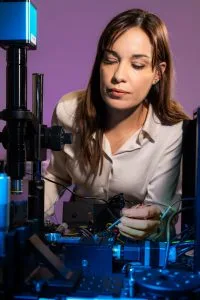Silvia Zorzetti, an engineer at the Department of Energy’s Fermi National Accelerator Laboratory, has received a $2.5 million Early Career Award from the Department of Energy for her research in quantum information preservation. Zorzetti is working on improving the transportation of quantum information to prevent loss or damage. Her research could have significant implications for national security, quantum communication, and network technologies. Zorzetti is currently exploring the use of microwave-optical transducers and superconducting cavities to enhance conversion efficiency and prevent information loss, potentially advancing the creation of the quantum internet and quantum networks.
Silvia Zorzetti’s Quantum Research Recognized with DOE Early Career Award
Silvia Zorzetti, an engineer at the Department of Energy’s Fermi National Accelerator Laboratory, has been recognized for her innovative research in quantum science. She has been awarded the Early Career Award from the Department of Energy, which will provide $2.5 million over the next five years to support her work. Zorzetti’s research focuses on improving the preservation and transportation of quantum information, a critical aspect of data storage and connectivity in our digital age.
Quantum information is highly sensitive and can be lost due to material and environmental disturbances, a phenomenon known as decoherence. To combat this, researchers at the Superconducting Quantum Materials and Systems Center at Fermilab use superconducting radio-frequency devices and ultra-cold refrigerators to extend the lifetime of quantum information. Zorzetti’s research aims to further enhance this process by figuring out how to transmit quantum information out of these refrigerators without causing damage.
Advancing Quantum Information Science
Zorzetti’s project has the potential to uncover new potentials in quantum information science, specifically by improving the transfer of quantum information from ultra-cold fridges onto fiber optics. This capability to transmit quantum information over significant distances could have implications for various scientific domains, including national security, quantum communication, and network technologies.
Zorzetti is currently investigating microwave-optical transducers, tools that convert microwave photons into optical photons—tiny packets of light. She proposes to explore the use of superconducting cavities with long coherence time to enhance the conversion efficiency and employ fiber-optic cabling and optical photon counters to prevent information loss.
Overcoming Challenges in Quantum Information Readout
Reading out quantum information poses a significant challenge. External electronics used to amplify the quantum information introduces noise and may lead to information loss. Microwave-optical transducers offer a solution by efficiently counting single photons in the optical region, where photon counting is more feasible.
Zorzetti believes that optical readout has proven to be the most efficient method for many applications. The challenge lies in the conversion process. If we can efficiently convert microwave to optical photons at the quantum threshold, we preserve the information and enhance the overall efficiency compared to typical methods. Through careful design and optimal engineering, it seems possible to improve the microwave-optical conversion efficiency up to 50%, a result still out of reach.
Zorzetti’s Journey and Future Research
Zorzetti’s journey at Fermilab spans 12 years. She first joined the lab as a participant in the Italian Summer Student program in 2011. She joined the laboratory as an employee in 2017. In addition to the research she leads at SQMS, Zorzetti also serves as the Ecosystem and Workforce Development leader for the center.
Zorzetti’s research will occur at the SQMS Center, one of five DOE quantum information science centers. SQMS’s hallmark is understanding the foundational materials used in quantum information science. Zorzetti’s award builds on this work and moves it forward. The proposed research will utilize and expand existing facilities, equipment, and infrastructure initiated with Fermilab’s Lab Directed R&D program.
The Role of Fermilab and SQMS in Quantum Information Science
The Superconducting Quantum Materials and Systems Center at Fermilab is supported by the DOE Office of Science. It is one of the five U.S. Department of Energy National Quantum Information Science Research Centers. Led by Fermi National Accelerator Laboratory, SQMS is a collaboration of more than 30 partner institutions—national labs, academia and industry—working together to bring transformational advances in the field of quantum information science. The center leverages Fermilab’s expertise in building complex particle accelerators to engineer multiqubit quantum processor platforms based on state-of-the-art qubits and superconducting technologies. Working hand in hand with embedded industry partners, SQMS will build a quantum computer and new quantum sensors at Fermilab, which will open unprecedented computational opportunities.

